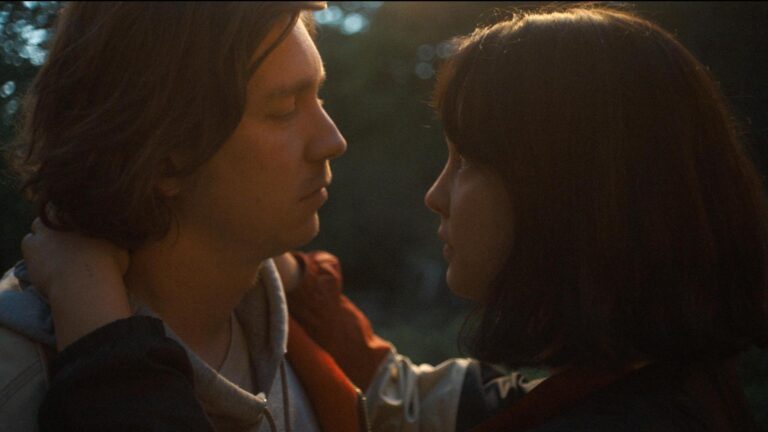
Eating disorders are a miserable affliction, and one of the most difficult and complicated facets of their manifestation is that they’re often imperceivable to others. Body dysmorphia can cause people who appear thin and attractive to doubt themselves at every moment, often leading them to take drastic measures to attempt to become more like those they see and consider beautiful and fit. Parachute presents a story of one young woman crippled by her condition and struggling with a community that largely won’t acknowledge that she is going through something very legitimate and real.
Riley (Courtney Eaton) has just gotten out of the hospital and started in a program that will allow her to confront her eating disorder. She breaks one of the cardinal rules of the program and begins a relationship with Ethan (Thomas Mann), though she is determined to keep things platonic during her first year of recovery. As the two of them become extremely close, Riley struggles to stay healthy and not give in to her mind’s dangerous signals. Though Ethan is eternally understanding while clearly wanting a romantic relationship, Riley can’t accept that anyone would want to be with someone like her.
This film marks actress Brittany Snow’s directorial debut, and she shared at a SXSW screening that Riley is inspired by her own experiences earlier in her career. To those around her, she appears happy and in control, yet she is paralyzed by self-doubt and obsessive behavior when she’s left alone with her thoughts for too long. That overwhelming sentiment is portrayed visually through quick flashes to areas of each woman’s body that she sees, and Riley verbalizes this tendency when she tells her therapist (Gina Rodriguez) that she’s even doing it with her during their session.
Riley takes refuge in true-crime podcasts, which serve both as a frantic escape for her from the real world and also fuel a subplot that finds Riley working at a dinner theater run by Bryce (Dave Bautista), who is eternally frustrated by the ability of diners to guess the killer within minutes of the start of the show. That provides some much-needed levity for this story, which at times feels like a romantic comedy before Riley is viciously pulled back to a place of despair. The representation of her indulging her cravings is particularly intense, and it holds nothing back, surely prompting a more sympathetic response from audiences than the one Riley gets from her then-boyfriend.
Eaton delivers a masterful performance that delicately navigates the balance between her gregarious interactions with friends and her hidden moments of inner strife. She’s terrifically paired with Mann, who almost a decade ago anchored the wonderful Me, Earl, and the Dying Girl. Their friendship feels authentic, and they move and grow with it as it continues to develop and take on a new shape. Their flirtation is endearing, but it’s the moments where they lash out at each other and hurl unforgivable insults that resonate the most.
Snow, who also co-wrote the screenplay with Becca Gleason, adds in other elements to enhance the film, like photo montages of Riley and Ethan spending time together that serve to answer questions about where they’re at and what Riley has been doing with her time. That device helps to romanticize Riley’s experience, highlighting mostly the good moments, which makes the interruption of real symptoms all the more jarring and impactful. This film does not sugarcoat the severity and destructive nature of eating disorders, instead offering a human portrait of someone reckoning with her flaws and trying to find a way to accept herself.
Grade: B+
Check out more of Abe Friedtanzer’s articles.
Parachute makes its world premiere in the Narrative Feature Competition at SXSW.

